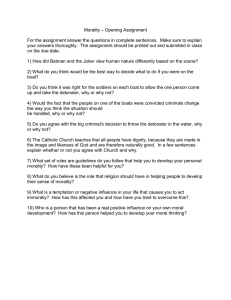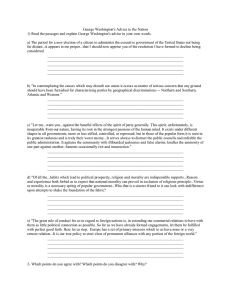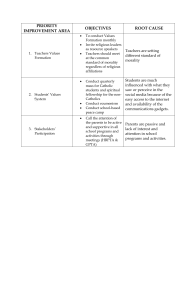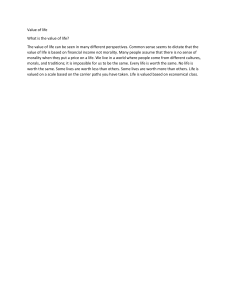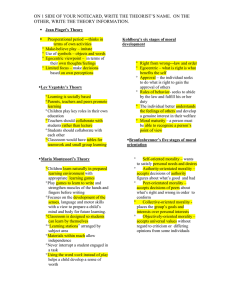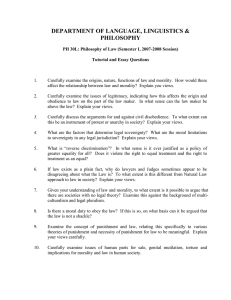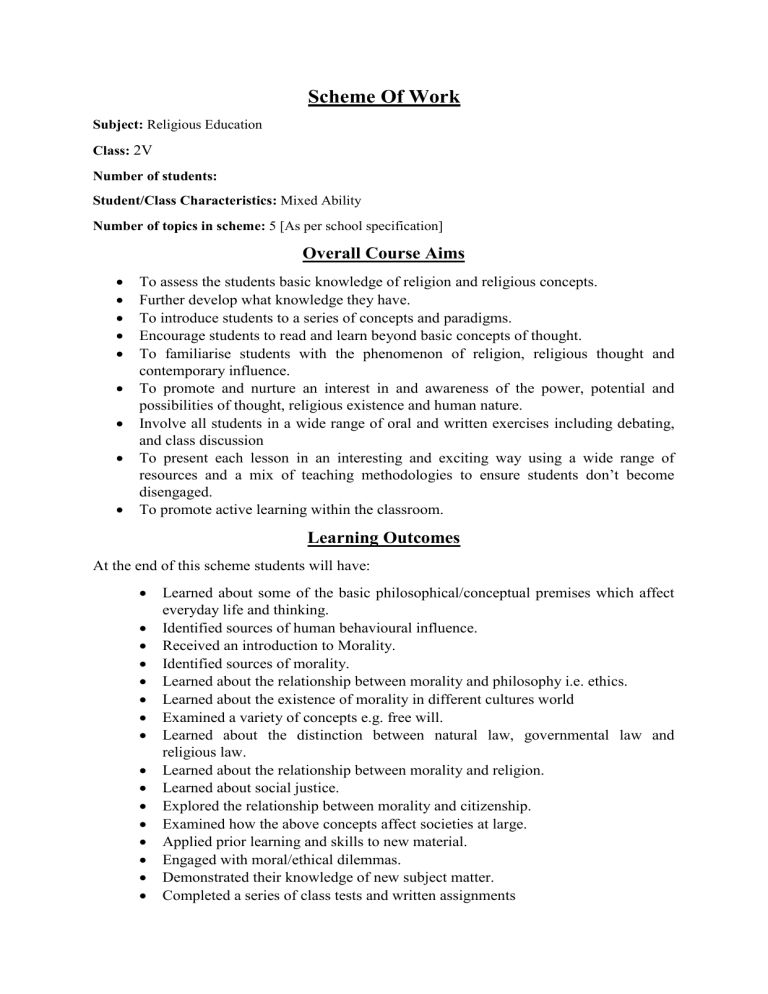
Scheme Of Work Subject: Religious Education Class: 2V Number of students: Student/Class Characteristics: Mixed Ability Number of topics in scheme: 5 [As per school specification] Overall Course Aims To assess the students basic knowledge of religion and religious concepts. Further develop what knowledge they have. To introduce students to a series of concepts and paradigms. Encourage students to read and learn beyond basic concepts of thought. To familiarise students with the phenomenon of religion, religious thought and contemporary influence. To promote and nurture an interest in and awareness of the power, potential and possibilities of thought, religious existence and human nature. Involve all students in a wide range of oral and written exercises including debating, and class discussion To present each lesson in an interesting and exciting way using a wide range of resources and a mix of teaching methodologies to ensure students don’t become disengaged. To promote active learning within the classroom. Learning Outcomes At the end of this scheme students will have: Learned about some of the basic philosophical/conceptual premises which affect everyday life and thinking. Identified sources of human behavioural influence. Received an introduction to Morality. Identified sources of morality. Learned about the relationship between morality and philosophy i.e. ethics. Learned about the existence of morality in different cultures world Examined a variety of concepts e.g. free will. Learned about the distinction between natural law, governmental law and religious law. Learned about the relationship between morality and religion. Learned about social justice. Explored the relationship between morality and citizenship. Examined how the above concepts affect societies at large. Applied prior learning and skills to new material. Engaged with moral/ethical dilemmas. Demonstrated their knowledge of new subject matter. Completed a series of class tests and written assignments Sequential List Of Topics September – December Section F – The Moral Challenge: Part 1 – 5 - September 2nd– My Rules/Ice Breakers September 4th – Worldviews/P4C September 7th – Worldviews/P4C September 9th - Morality September 11th - Morality September 14th – Free to choose September 16th – Action and consequence September 18th – Action and consequence September 21st – Relationships September 23rd – Revision September 25th – Test September 28th – Codes of behaviour September 30th – Codes of behaviour October 2nd – Sources of morality October 5th – The 10 Commandments October 7th – The commandments of love October 9th – The wisdom of others October 12th – Revision October 14th – Test October 16th - Developing morality (i) October 19th – Developing morality (ii) October 21st – Developing morality (iii) October 23rd – Conscience October 26th – Revision November 2nd - Test November 4th - Making moral decisions November 6th - Making moral decisions November 9th – Making moral decisions November 11th - Social justice November 13th – Respect for life November 16th - Care for the earth November 18th – Moral failure November 20th – Healing broken relationships November 23rd - Revision November 25th - Test November 27th – Law and personal morality November 30th - Law and personal morality December 2nd - Law and Religious morality December 4th – Law and Religious morality December 7th - Revision December 9th - Revision December 11th - Revision December 16th – Christmas Test December 18th - Christmas class Rationale For Sequencing Of Topics According to school guidelines, this classgroup will begin the year with Section F – The Moral Challenge. Given that this content is related to one of the five core branches of Philosophy, it is my intention to spend three lessons introducing the students to the topic via a number of accessible contemporary mediums e.g. social media, Youtube clips etc. Furthermore, this introduction should serve as a neat platform from which the textbook content may be expounded. This topic should tie in neatly with the student’s previous learning on world views and different cultures. The content taught in this section is imperative to children’s ability to conceive the way in which law governs the world and how the person’s actions are formulated from upbringing and psyche to physical/verbal manifestation. Their ability to apply prior learning/understanding to new material will be challenged frequently in the form of oral questions, hypothetical scenarios and group discussions, in addition to summative assessments. I intend to test students’ understanding of content with moral/ethical dilemmas, as well as written exams at the end of each sub-topic. Teaching And Learning Methods To Be Used Teacher led activities. Student directed activities. Oral questioning. Written assignments. Problem solving and decision making exercises. Presentation and interpretation of data. Self-assessment activities. Peer assessment activities. Philosophy for Children Use of the Socratic method Activity based learning. Discussion. Visual, auditory, tactile and kinaesthetic learning styles. Numeracy – I have devised a method of logical reasoning through the form of simultaneous equations. Group work. Pair work. Support students development in literacy in numeracy by challenging and developing their speaking, listening and written skills, with attention paid to the school’s literacy and numeracy policy. Material / Equipment To Be Used Roll book. Textbook: Religion for Living A variety of hand-outs. Worksheets Homework sheets Games e.g. Chinese whispers, Musical chairs. Real life applications and authentic assessments. OHP. Coloured markers. White board. Past Junior Certificate exam papers. Ted Talks P4C [Philosophy for Children] PowerPoint presentations. YouTube clips. Google images. Humans of New York Resources from various websites e.g. www.tes.com, www.primaryresources.com Strategies for Assessment Assessment of Learning Assessment of learning will take place during each lesson by oral questioning, written assignments, group work and various exercises. Open and closed, higher and lower order questions will be asked throughout the course of each lesson. Moving about the class and checking the students work. Students will be assigned written homework after every lesson. Oral questions will be asked at the beginning of each class to recap the material covered in the previous lesson. Oral and visual checking of homework. There will be a series of questions at the end of each lesson to assess that new material has been understood. Students will be assessed summatively in the form of monthly revision tests, as well terminal exams both the mid-term and Christmas periods. Assessment for Learning Provide students with lesson aims and objectives at the start of each lesson. Higher and lower order questions throughout each lesson and also at the end of each lesson to assess the material covered during the lesson. Effective questioning will help students see the links between new material and prior learning to push them towards more precise thinking and expression. The use of feedback: I will use the ‘sandwich’ method when given written feedback in students’ copies. This feedback will aid the development of the student. Written assignments will assess students’ ability to apply the knowledge from the classroom to their work. Questioning techniques that will generate interesting discussion Questioning named students to test understanding and recall. Monitoring the progress of students engaged in writing/group assignments in class. Observation of students’ level of engagement with class work. A series of oral questions employed to test understanding, as well as knowledge.

